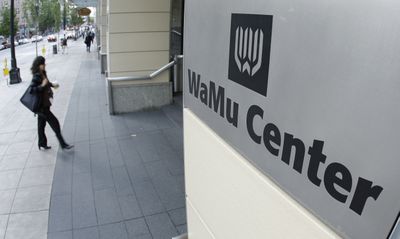WaMu takeover a calculated risk
But many see little downside to JP Morgan Chase purchase

WASHINGTON – The government’s seizure and sale of Washington Mutual Inc. eases pressure on a federal fund that insures Americans’ bank deposits and places a high-stakes opportunity – with minimal risk – into the hands of JPMorgan Chase & Co. Inc.
The CEO of WaMu is entitled to more than $13 million in severance and bonus pay. U.S. taxpayers, meantime, could end up shouldering billions of dollars worth of shaky mortgages and other investments that contributed to WaMu’s demise. Such a scenario assumes the massive bailout proposed by Treasury Secretary Henry Paulson, or something like it, will be approved and JPMorgan will sell WaMu’s least desirable assets to the government.
For its $1.9 billion investment, JPMorgan gets control of the nation’s largest thrift – more than 5,000 branches in 23 states. It also assumes a highly stressed loan portfolio that could result in a $31 billion write-down.
While JPMorgan would be in a position to limit such a hit by taking advantage of a Paulson-like bailout plan, analysts said the bank is strong enough – it had $98.7 billion in capital at the end of the second quarter – to shoulder the write-down on its own.
“I don’t think they need the government bailout to make WaMu work,” said Len Blum, managing director of Westwood Capital. “They have the capital, they have the strength to hold those assets and take the write-down.”
Blum expects the bank to benefit from the bailout in a more indirect way – as strong banks will prosper in a more stable market environment.
During a conference call with investors Thursday night, JPMorgan Chief Executive Jamie Dimon said the government’s proposed bailout plan wasn’t a factor in the acquisition.
Some experts said that’s just not plausible.
Jim Wilcox, a finance professor at the University of California Berkeley’s Haas School of Business, said he believes JPMorgan based its acquisition of WaMu on the assumption that a Paulson-like bailout plan would pass.
Bart Narter, senior vice president of banking at Boston-based research and consulting firm Celent, said JPMorgan made a calculated risk.
In a vote of confidence in JPMorgan’s action, investors bought 246.9 million new shares on Friday at $40.50 apiece, a 7 percent discount to Thursday’s closing price of $43.46. That raised gross proceeds of $10 billion, well above the $8 billion it had originally planned to raise.
Ultimately, though, JPMorgan has taken a gamble.
There is still a risk that the bank will be forced to write down more than $31 billion on the troubled assets it acquired, said Donn Vickrey, co-founder of Gradient Analytics. “But I just think it’s a gamble worth taking and they have the capital to handle it if it does become worse,” he said.
Washington Mutual’s lucrative deposits outweigh any risk due to the write-down, Vickrey said. And, in the end, if the bank actually ends up making a little money on the loans, that’s just a bonus, he said.
JPMorgan’s rescue of WaMu on Thursday was the second time in six months that it has taken over a major financial institution crippled by bad bets in the mortgage market. In March, it was Bear Stearns Cos. that was in trouble. JPMorgan paid $2.3 billion for the company and its stock — and the Federal Reserve helped grease the deal by providing a $29 billion loan.
A seizure of WaMu had been widely anticipated for some time because of the company’s heavy mortgage-related losses. It has seen its stock price plummet 95 percent from a 52-week high of $36.47.